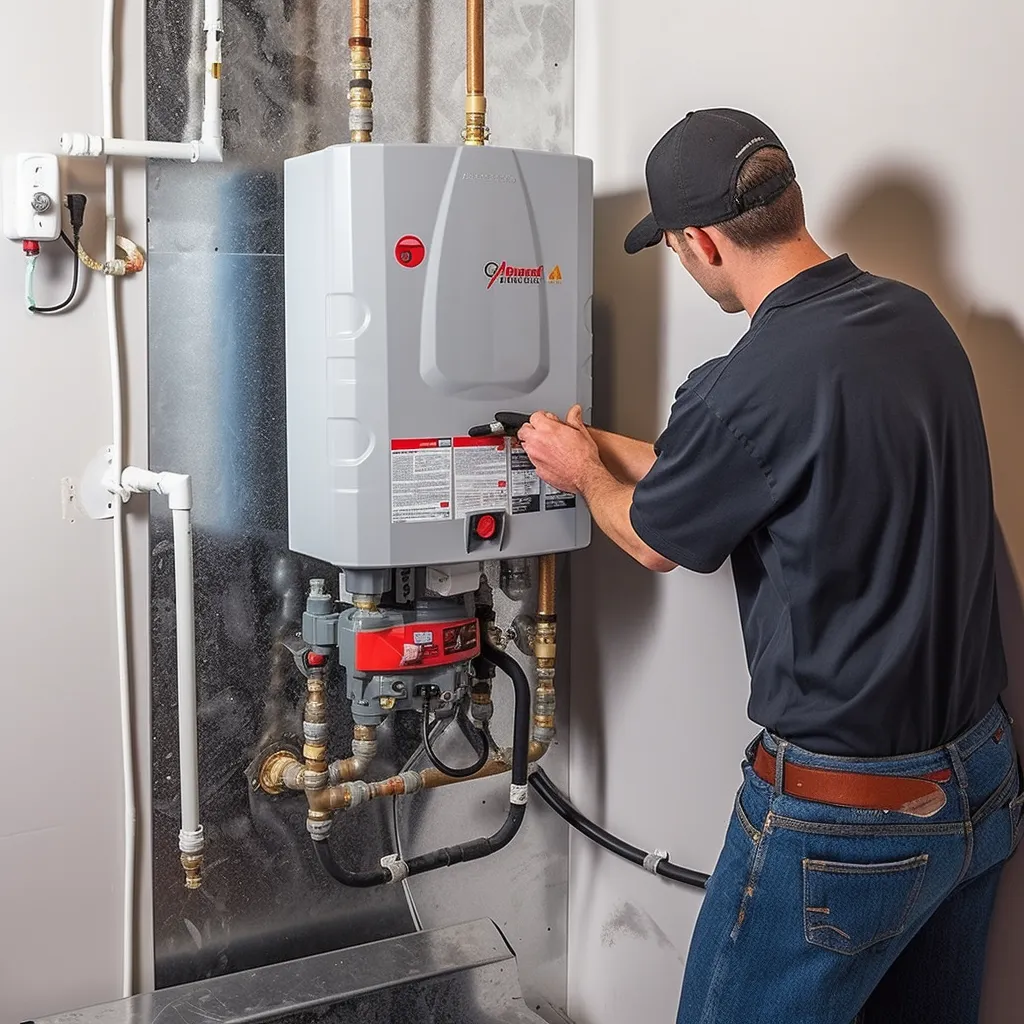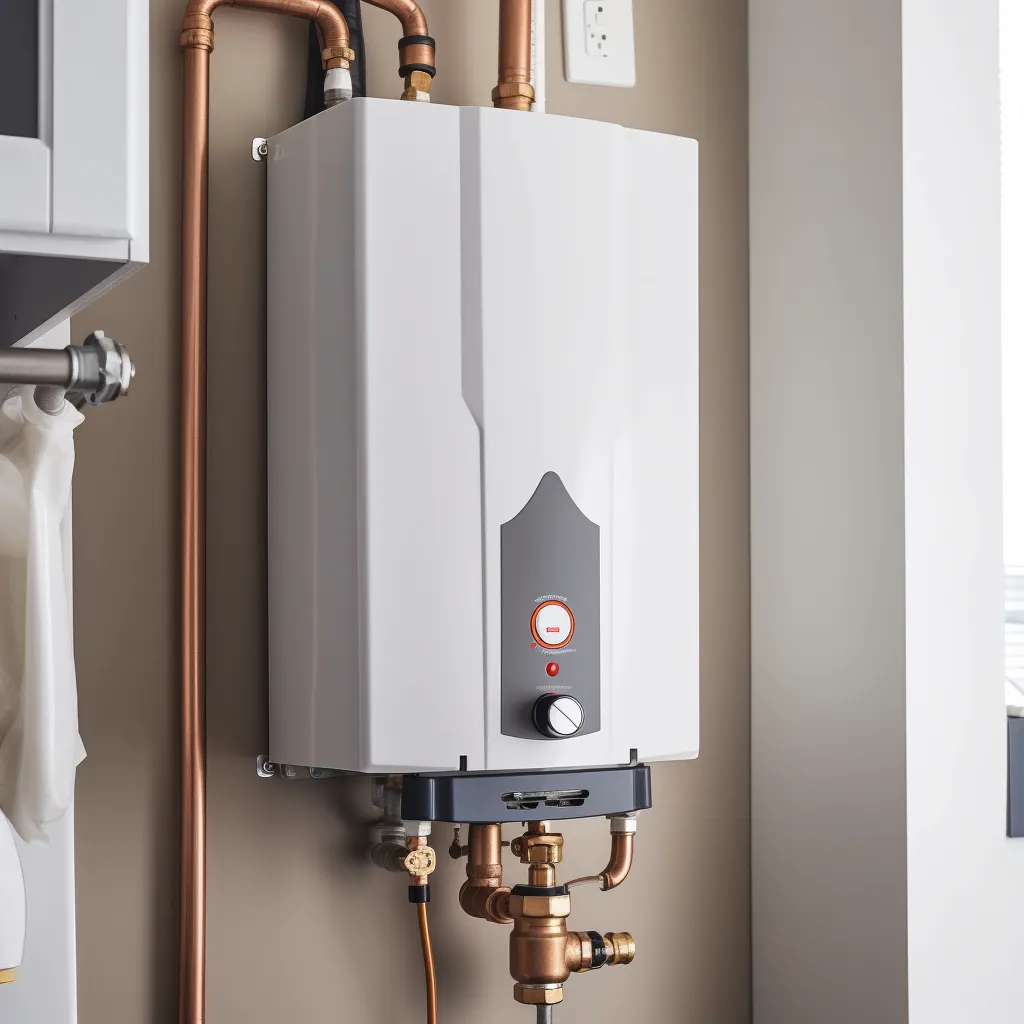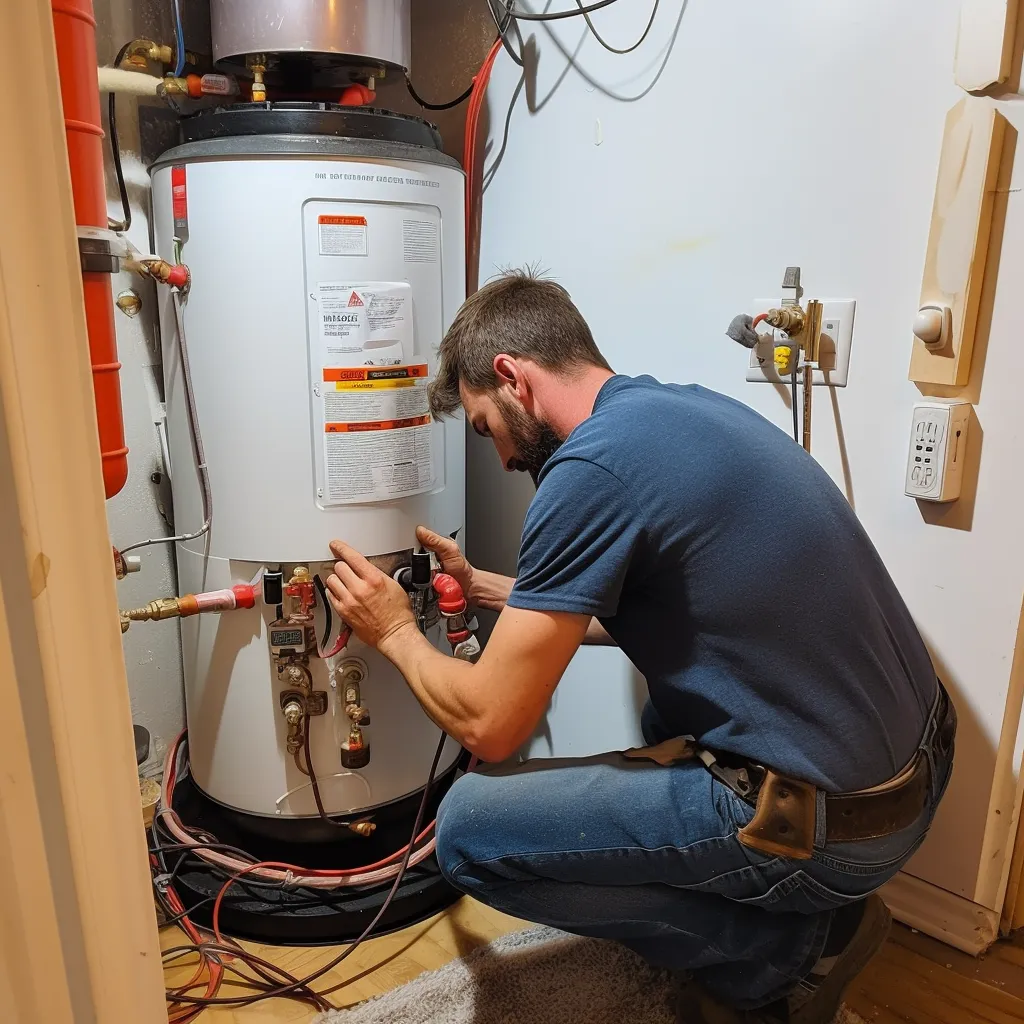Which Type of Water Heater is Best For Your Spring Home?
Choosing a new water heater can feel overwhelming due to the many options available. There are traditional tanks, solar units, and tankless models, each with varying levels of energy efficiency and hot water capacity. To help you make an informed decision based on your family's needs, our guide provides a comprehensive review of each water heater type. By reading on, you will be well-prepared to make the right choice. Remember to consider the unique pros and cons of each type before making your final decision.

Traditional Storage Tank Water Heaters
Tank-style water heaters are a common and efficient option for heating and storing water. They come in insulated tanks and use gas, electric, or oil to heat the water. This allows them to provide a continuous supply of hot water, so it's always ready when you want to use it. All you have to do is turn on the faucet.
Pros:
Save Money: Traditional water heaters come with a lower initial price tag, making them a cost-effective option compared to other models available in the market.
Extended warranty coverage: These water heaters often offer extended warranty periods, giving you extra protection and peace of mind.
Easy maintenance: Tank-style water heaters are simple to maintain and don't need complicated procedures.
Cons:
Traditional water heaters are not very energy efficient, which means they use more energy and can result in higher operating costs.
Limited capacity: The size of the tank decides how much hot water you have, so if it's too small, you might run out during busy times.
Water damage can occur if the water heater tank develops a leak or malfunctions. This can lead to substantial damage to the surrounding area.


Tankless Water Heaters
Tankless water heaters are a modern and efficient option for your home's hot water needs. Unlike traditional models that constantly heat and store water, tankless units only heat water when you need it. This not only saves energy, but also saves space in your home. Although the initial cost of a tankless water heater may be higher, the long-term savings on utility bills make up for it. With their energy-saving advantages, tankless water heaters are a more environmentally friendly and cost-effective choice.
Pros:
Simple Installation: The compact design of tankless water heaters ensures an easy and hassle-free installation process.
Save on your monthly bills with highly energy-efficient tankless water heaters. These advanced systems are designed to minimize energy consumption, resulting in consistently low costs.
Never worry about running out of hot water with a continuous supply that meets your needs.
Tankless water heaters are designed to last much longer than traditional water heaters, which means they save you money in the long run. With a longer lifespan, you can enjoy hot water for many years without the hassle of frequent replacements. Making the switch to a tankless water heater is a wise and cost-effective choice.
Cons:
These advanced water heaters may have a higher upfront cost, but they can save you money in the long run through improved energy efficiency and reduced utility bills.
Venting can be challenging in small spaces.
Limited capacity for high-demand applications.
Heat Pump Water Heaters
Heat pmp water heaters are popular for their efficiency and cost-effectiveness in heating water. They use a small compressor to extract heat from the air, making them an energy-efficient choice. The great thing is that they can give you hot water without using a lot of energy, which means savings for you. Furthermore, heat pump water heaters work without electricity, so you can have a dependable supply of hot water even during power outages. Experience the advantages of a cost-effective and reliable hot water solution with a heat pump water heater.
Pros:
Save on your utility bills with a heat pump water heater. These water heaters are designed to be highly energy efficient, helping you reduce your overall energy consumption and lower your monthly expenses.
These water heaters use renewable energy from the air, making them a greener choice that helps to protect the environment.
Even when the power goes out, you can still enjoy a steady supply of hot water with a heat pump water heater. These innovative appliances are designed to keep working even when the electricity is off.
Cons:
Heat pump water heaters tend to be pricier in the beginning compared to regular water heaters.
These water heaters need to be installed in areas with adequate ventilation and enough space.
Heat pump water heaters have a limited capacity which means there may be less hot water available for each use.


Heat Pump Hybrid Water Heaters
Heat pump hybrid water heaters are an energy-efficient and cost-effective option for heating water in your home. These water heaters work by using heat from the air surrounding them to warm up the water. This makes them more efficient than traditional water heaters that rely solely on electricity or gas.
Pros:
One of the biggest advantages of heat pump hybrid water heaters is their energy efficiency. By using the heat from the air instead of generating heat from scratch, they can save you a significant amount of money on your monthly energy bills.
They are also better for the environment as they produce fewer emissions. Heat pump hybrid water heaters also have a longer lifespan compared to traditional water heaters. This is because they don't have to work as hard to heat the water, which reduces wear and tear on the system.
They are also less prone to damage from sediment buildup, which can cause issues with traditional water heaters. Another benefit of heat pump hybrid water heaters is their versatility.
They can be used in both residential and commercial settings, making them suitable for a wide range of applications.
They are also available in different sizes to accommodate the needs of different households.
Many models come with programmable settings, allowing you to set specific temperatures and schedules for hot water usage. They may also have built-in leak detection systems and self-cleaning functions to ensure optimal performance and safety.
Cons:
Higher initial cost compared to conventional storage water heaters.
Potential ventilation and space requirements that may pose installation challenges.
Limited capacity means that there is a specific amount of hot water available for each use.
There is a potential risk of water damage in the event of a tank failure or leakage.
Solar Powered Water Heaters
Solar water heaters are a great way to reduce your monthly utility bills and use renewable energy. There are two types to choose from: active and passive systems. Both types work by using the sun's energy to heat water, which helps you save money and be eco-friendly. By choosing a solar water heater, you can lower your energy costs and support a sustainable way of heating water.

Active Systems:
Active solar-powered water heaters use pumps to move hot fluid from the collectors to a storage tank. This allows them to efficiently generate large amounts of hot water. These systems make the most of solar energy and ensure you have plenty of hot water for your home.
Passive Systems:
Passive solar water heaters use the sun's energy to heat water, without the need for external power sources. They work by relying on natural convection, which is the process of hot fluid rising and cooler fluid sinking. This movement transports the heated fluid from the collectors, where solar energy is absorbed, to a storage tank where the water is stored for later use.
Pros:
The high efficiency of solar heaters help you save money on energy costs.
The use the sun's renewable energy.
Longer lifespan compared to traditional water heaters.
Cons:
Higher upfront cost when compared to traditional storage tank heaters.
Installing solar water heaters can be complicated due to the need for extra space and equipment.
One potential risk of solar panels is the possibility of water damage if they become faulty or damaged. This can occur if there are cracks or other issues with the panels that allow water to penetrate them. If water seeps into the panels, it can affect their performance and lead to further damage. It is important to regularly inspect and maintain your solar panels to minimize the risk of water damage.


Point-of-Use Water Heaters
Point-of-use water heaters are compact and efficient devices that provide hot water directly at the point of use. These water heaters are installed near the sink, shower, or any other area where hot water is needed. They are a great solution for homeowners who require hot water quickly and efficiently, without the need for a large, centralized water heating system.
Pros:
These units have a high energy-efficiency, which means lower monthly utility bills.
Their compact size makes installation and maintenance a breeze, even in tight spaces.
Longer lifespan compared to storage tank heaters.
Cons:
Higher initial cost and potential need for extra ventilation and installation space.
Reduced hot water capacity can result in a restricted amount of hot water available for each use.
Higher risk of water damage due to tank failure or leaks.
Water Heaters With Hydronic Boilers
Water heaters with hydronic boilers are a popular choice for heating water in residential and commercial buildings. These innovative systems combine a water heater and a boiler into one unit, providing efficient heating and hot water solutions. Hydronic boilers utilize water as the medium to transfer heat, which makes them highly efficient. They work by heating the water and distributing it through a network of pipes to different areas of the building. This even distribution of heat ensures consistent and comfortable temperatures throughout the space.

Pros:
One of the main advantages of water heaters with hydronic boilers is their energy efficiency. By using water as the heat transfer medium, these systems can achieve high levels of efficiency, resulting in lower energy bills.
The ability to zone the heating allows for precise temperature control, further enhancing energy savings.
Another benefit of these systems is their versatility. Water heaters with hydronic boilers can be used for various applications, including space heating, domestic hot water production, and even pool and spa heating.
They can also be integrated with other renewable energy sources, such as solar panels, to further reduce energy consumption and environmental impact.
In terms of installation and maintenance, water heaters with hydronic boilers are relatively straightforward. They can be easily integrated into existing heating systems, replacing outdated equipment without the need for major modifications.
Cons:
Although initial costs may be higher compared to traditional storage models, the advantages of investing in newer storage solutions outweigh this consideration in the long run.
Smaller size, leading to a decreased amount of hot water for each use.
Potential for noise during operation.
You may not qualify for some utility rebates or incentives.


Smart Water Heaters
Smart water heaters are technologically advanced appliances that offer many benefits for homeowners. These innovative devices are integrated with smart features that allow users to control and monitor their water heaters remotely.
Pros:
Gone are the days when you had to manually adjust the temperature of your water heater. With smart water heaters, you can conveniently set the desired temperature through an app on your smartphone or tablet. This means you can enjoy hot water at your preferred temperature without having to leave your couch or bed.
In addition to remote control, smart water heaters come with built-in timers and scheduling features. This means you can easily program your water heater to turn on or off at specific times of the day. For example, you can set it to turn on before you wake up in the morning, so you have hot water ready for your shower. This not only saves you time and effort but also helps you conserve energy by only heating water when you need it.
Another advantage of smart water heaters is their ability to provide detailed usage data. Through the accompanying app, you can see how much energy your water heater is consuming and track your usage patterns over time. This information can help you make informed decisions about your energy consumption and find ways to reduce your utility bills.
Smart water heaters often come equipped with advanced safety features. For instance, they can detect leaks and automatically shut off the water supply to prevent any further damage. This can save you from costly repairs and potential water damage to your home.
Cons:
Higher cost compared to traditional storage water heaters.
Certain utility rebates or incentives may not be applicable.
In order to ensure compatibility with newer devices, it may be necessary to implement additional software updates. These updates are necessary to ensure that the software can effectively communicate and function with the latest models and technologies.
If your Wi-Fi connection is not secure, there are several potential security risks that you should be aware of. First and foremost, a lack of security on your Wi-Fi network makes it vulnerable to unauthorized access. This means that anyone within range of your network could potentially connect to it and gain access to your personal information or use your internet connection without your permission.

Condensing Water Heaters
Condensing water heaters are a combination of tankless and traditional storage tank water heaters. They use advanced technology to extract heat from exhaust gases, which helps maximize efficiency and save on costs. Instead of letting this heat go to waste, condensing water heaters capture and use it, resulting in improved performance and greater energy efficiency.
Pros:
One of the benefits of condensing water heaters is their high efficiency ratings. These units can achieve efficiency levels of up to 98%, meaning that a large majority of the energy they consume is converted into hot water. This can result in significant energy savings and lower utility bills.
Another advantage of condensing water heaters is their lower environmental impact. By utilizing heat recovery technology, these units produce fewer greenhouse gas emissions compared to traditional water heaters. This makes them a more environmentally friendly choice for heating your water.
Condensing water heaters are also known for their ability to provide a consistent supply of hot water. With their advanced heat recovery system, these units have a faster recovery time, meaning they can quickly heat up a new supply of water to meet your hot water demands.
When it comes to installation, condensing water heaters can be installed in various locations such as basements, utility rooms, or even outdoors.
They also come in a range of sizes and capacities to suit different household needs.
Cons:
Higher initial cost.
Space and ventilation requirements.
Limited hot water capacity can be a frustrating issue for many households. When there is not enough hot water available, it can lead to discomfort and inconvenience.
How to choose the right water heater for your home

How to choose the right water heater for your home
Choosing the right water heater for your home is important to ensure you have a reliable and efficient source of hot water. There are a few factors to consider when making your decision. First, determine the type of water heater that will best suit your needs. The most common types are storage tank water heaters and tankless water heaters. Storage tank water heaters have a large tank where water is heated and stored until it is needed. These are typically less expensive to install, but they take up more space and can run out of hot water if the tank is not large enough for your household's needs. Tankless water heaters, on the other hand, heat water on demand and do not have a storage tank. They are more energy-efficient and can provide an endless supply of hot water, but they can be more expensive to purchase and install. Next, consider the size and capacity of the water heater. The size you need will depend on the number of people in your household and your daily hot water usage. A professional can help you determine the appropriate size based on your specific needs. It is also important to consider the energy efficiency of the water heater. Look for models with a high Energy Factor (EF) rating, as these will be more efficient and cost-effective in the long run. Additionally, consider purchasing a water heater with insulation to reduce heat loss and improve energy efficiency. Lastly, don't forget to consider the installation and maintenance requirements of the water heater. Some models may be more complex to install and require professional assistance. Regular maintenance, such as flushing the tank and checking the pressure relief valve, is also necessary to keep your water heater in good working condition.

When should you get a new water heater?
Knowing when to replace your water heater is important for maintaining a reliable and efficient hot water supply in your home. There are several signs that indicate it may be time to replace your water heater:
Consider the age of your water heater. Most traditional tank-style water heaters have a lifespan of around 8-12 years. If your water heater is reaching or exceeding this age range, it is likely nearing the end of its useful life and replacement may be necessary.
Pay attention to the performance of your water heater. If you are experiencing a decrease in hot water supply or it takes longer for your water to heat up, it could be a sign that your water heater is failing.
If you notice any leaks or corrosion on the tank or pipes, this is another indicator that replacement may be needed. Energy efficiency is also a factor to consider.
Older water heaters tend to be less efficient, leading to higher energy bills. Upgrading to a newer, more energy-efficient model can help you save money in the long run.
Safety is a crucial consideration. If you notice any signs of a malfunctioning or faulty water heater, such as strange sounds, odors, or pilot light issues, it is important to have it inspected by a professional. This can help prevent potential hazards such as leaks or explosions.
Installing a new water heater may seem expensive, but the benefits make it worth it. It will save energy and work well for a long time. A qualified plumber can help you choose the right water heater for your needs and make sure it is installed correctly for maximum efficiency and durability.
Maintenance tips for water heater efficiency
Keeping your water heater in good working condition is important for its performance and longevity. Regular maintenance helps prevent problems and ensures that your water heater runs efficiently. By following some simple maintenance routines, you can ensure that your water heater continues to provide you with affordable and dependable hot water.
Reasons to hire a licensed plumber to replace your water heater
There are several advantages to hiring a licensed plumber to replace your water heater:

Licensed plumbers have the necessary knowledge and training to safely and effectively install a new water heater.
They have a thorough understanding of local building codes and regulations, ensuring that the installation is done correctly and up to standard.
Licensed plumbers have access to the proper tools and equipment needed to replace a water heater.
They are familiar with different types and brands of water heaters, and can recommend the most suitable option for your specific needs.
They also have the expertise to handle any potential complications or unforeseen issues that may arise during the installation process.
Hiring a licensed plumber provides you with peace of mind. You can trust that the job will be done correctly the first time, minimizing the risk of any future problems or malfunctions.
Licensed water heater experts are also insured, which means you are protected in case of any damages or accidents that may occur during the installation.
By hiring a licensed plumber, you are ensuring that the warranty on your new water heater remains valid. Many manufacturers require professional installation in order to honor the warranty. By having a water heater professional perform the installation, you can avoid any potential issues with the warranty coverage.
Choosing a licensed plumber for water heater replacement is a smart choice that comes with many advantages. By opting for a professional, you can save both time and money, as well as steer clear of any future complications.
Contact Us
